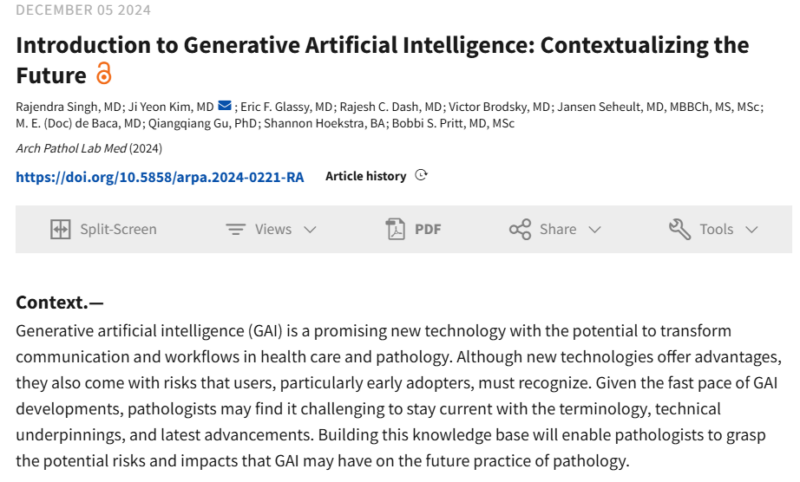Osama Khan, Staff Pathologist at Natera and Pathology network consultant for Path AI, shared an article by Rajendra Singh on LinkedIn:
““It is clear to me that AI will never replace physicians—but physicians who use AI will replace those who don’t.”
– Dr. Jesse Ehrenfeld, President of the American Medical Association.
This insightful quote by Dr. Ehrenfeld underscores the critical importance of embracing AI and digital workflows in medical practice. It highlights how these technologies are shaping the future of healthcare and the evolving role of medical professionals.
A recent article by Singh et al., supported by the Association of Pathology Informatics (API), the College of American Pathologists (CAP), and the Digital Pathology Association (DPA), explores the rapid advancements in Generative Artificial Intelligence (GAI).
The article discusses how pathologists can effectively integrate GAI into their daily practice, ultimately setting them up for success while enhancing patient care outcomes.
These are some of my thoughts:
The rapid advancements in Generative AI (GAI) are set to revolutionize healthcare, particularly in diagnostics, patient outcomes, treatment plans, and disease prognoses. This technology holds the promise to extend its impact beyond pathology, offering patients new tools to better understand their healthcare journey.
However, the speed at which GAI is evolving presents challenges for regulatory and safety frameworks, making it difficult to establish consistent best practices. Pathologists must play an active role in the ethical and accurate implementation of GAI, focusing on interpretable AI methods and addressing uncertainty in the decision-making process.
While GAI models are powerful, they are not without flaws. They are built on historical data, which can include biases and may struggle with rare or atypical diseases. This is why the expertise of pathologists and clinicians is crucial in maintaining a “human-in-the-loop” approach to ensure GAI-generated insights are applied responsibly.
Pathologists are encouraged to collaborate with IT and data analytics teams, integrate GAI into teaching, research, and clinical care, and educate the next generation of professionals on the safe use of AI. Active participation in AI-related organizations and contributing to research will be essential for advancing this exciting field.
Check out the full article below!”
Introduction to Generative Artificial Intelligence: Contextualizing the Future.
Authors: Rajendra Singh, et al.



